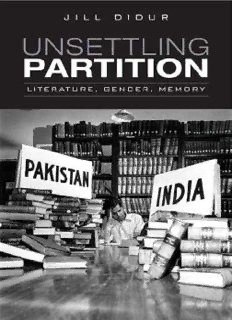
Unsettling Partition: Literature, Gender, Memory PDF
Preview Unsettling Partition: Literature, Gender, Memory
UNSETTLING PARTITION: LITERATURE, GENDER, MEMORY This page intentionally left blank JILL DIDUR Unsettling Partition Literature, Gender, Memory UNIVERSITY OF TORONTO PRESS Toronto Buffalo London www.utppublishing.com © University of Toronto Press Incorporated 2006 Toronto Buffalo London Printed in Canada ISBN-13: 978-08020-7997-8 ISBN-10: 0-8020-7997-0 Printed on acid-free paper Library and Archives Canada Cataloguing in Publication Didur, Jill, 1965– Unsettling partition : literature, gender, memory / Jill Didur. Includes bibliographical references and index. ISBN-13: 978-0-8020-7997-8 ISBN-10: 0-8020-7997-0 1. Indic fiction (English) – 20th century – History and criticism. 2. India – History – Partition, 1947 – In literature. 3. Partition, Territorial, in literature. 4. Gender identity in literature. 5. Violence in literature. 6. Nationalism in literature. 7. Women in literature. I. Title. (cid:0) PK5416.D53 2006 823.91409954 C2005-904567-1 University of Toronto Press acknowledges the financial assistance to its publishing program of the Canada Council for the Arts and the Ontario Arts Council. This book has been published with the help of a grant from the Canadian Federation for the Humanities and Social Sciences, through the Aid to Scholarly Publications Programme, using funds provided by the Social Sciences and Humanities Research Council of Canada. University of Toronto Press acknowledges the financial support for its publishing activities of the Government of Canada through the Book Publishing Industry Development Program (BPIDP). For my family This page intentionally left blank Contents Acknowledgments ix Introduction: Unsettling Partition 3 1 ‘Making Men for the India of Tomorrow’? Gender and Nationalist Discourse in South Asia 21 2 Fragments of Imagination: Rethinking the Literary in Historiography through Narratives of India’s Partition 42 3 Cracking the Nation: Memory, Minorities, and the Ends of Narrative in Bapsi Sidhwa’s Cracking India 67 4 A Heart Divided: Education, Romance, and the Domestic Sphere in Attia Hosain’s Sunlight on a Broken Column 94 5 At a Loss for Words: Reading the Silence in South Asian Women’s Partition Narratives 125 Conclusion: Recovering the Nation? 157 AppendixA 163 Notes 165 Bibliography 181 Index 197 This page intentionally left blank Acknowledgments I owe thanks to many teachers, colleagues, and friends for the encour- agement and support they have given me during the course of writing this book. I thank my teachers at York University in Toronto, especially my supervisor Arun Mukherjee, Terry Goldie, and Marie-Christine Leps. I am grateful for the support and encouragement I received from Meenakshi Mukherjee at Jawaharlal Nehru University in Delhi while this research was in its early stages. I am indebted to the faculty at the Centre for the Study of Culture and Society in Bangalore, especially Tejaswini Niranjana and Ashish Rajadhyaksha, as well as Alok Bhalla at Central Institute of English and Foreign Languages in Hyderabad, for the opportunity to develop and present some of the ideas in this book at their institutions while I was a visiting fellow at CSCS. I thank my colleagues, students, and the staff in the Department of English at Concordia University in Montreal for providing me with a friendly and supportive intellectual environment. I thank friends who have inspired and encouraged me while I completed this project: Peter Babiak, Neil Badmington, Ritu Birla, Stephanie Bolster, Jason Camlot, Patrick Carroll, Bina Friewald, Craig Gordon, Allyson Hadwin, Teresa Heffernan, Stacey Johnson, Anna Kasier, Mwikali Kieti, Rita Kothari, David McGimpsey, Radhika Mongia, Anne-Marie Renzoni, Eve Saunders, Yumna Siddiqi, Kate Sterns, Charis Thompson, and Joost Vandenborre. At the University of Toronto Press, many thanks to my editor Jill McConkey for having faith in the manuscript, Barbara Porter for shepherding it through the publication process, and Jim Leahy for copy-editing. I am especially grateful to the Press’s anonymous readers for their detailed and insightful comments on the original manuscript. I thank Juliet Dunphy and my research assistant Heather Jessup for helping me prepare the manuscript for review and typesetting.
Description: